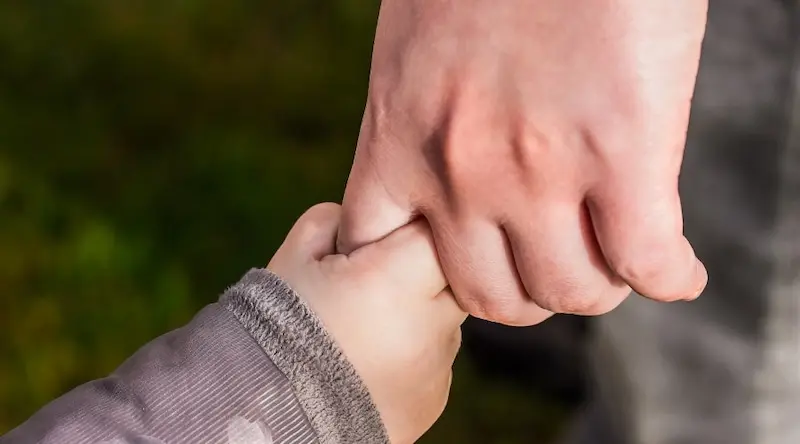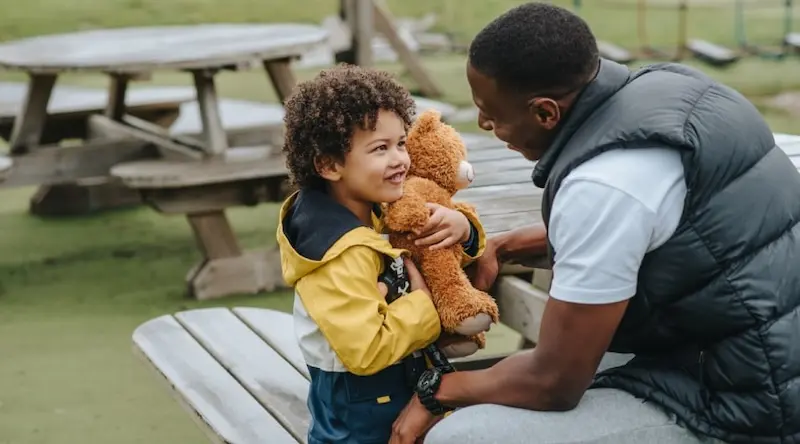settings
children
With Famly since
Decisions about whether to talk to young children about long-term illness and death are always tricky. Do you talk to them? What about the parents? Where do you even start?
Illness and death are delicate and highly emotive subjects themselves, as is bereavement - a period of mourning or intense grief following the death of a loved one. Adults often feel as though they need to protect children from the news that someone is terminally ill or has died.
Not just that, but they often find illness and death difficult to talk about, as oftentimes they’re grieving themselves. While trying to cope with the news on a personal level, they may not think about the importance of explaining what has happened to their children. Or they might not even know what to say.
Sue Asquith, Early Childhood Consultant, explores whether we should talk to children about these difficult topics, and what we might say if we do. There’s a lot to talk about, and none of it is as easy as we’d like it to be. Read on for her top ways to start the conversation, and how to keep the parents part of the decision.

Tricky topics
There are many topics that people find difficult to discuss. Death is one of them.
Adults often skirt around the topic or totally avoid these tricky conversations, as they don’t know where to start. However, this can often lead to adults not explaining illness and death to children, and therefore not supporting children’s understanding and feelings of grief.
For example, if a child's grandparent has just died, whether this was expected or not, the child's parents are understandably caught up in their own grief and finding their own ways to cope. They either want to protect their children from the news (and not tell them), simply don't consider the need to explain what has happened, or can’t find the right time or words.
In addition to this, there’s the complication of childhood being considered as a carefree time of innocence. Should we talk to children about someone dying?
Sadly, each year, around 23,600 children under the age of 18 will experience the death of a parent. Then there are many other bereavements, such as a member of their family, a family pet, a teacher/practitioner or a friend. Children need reassurance, help and support during these transitions. And that’s exactly why we need to start talking about it.
As we know, children are very astute, and will pick up on the acute signs of upset and distress. They may have overheard conversations or picked up on the emotions. By supporting and helping them understand, you’re doing more than you realise.
Why the topic has never been more important
Families all have their own, very unique experiences with illness and death. That being said, now might be the most relevant time to talk about it.
Children’s worries about the health and well-being of their family and friends may have been heightened over the past 2 years of living with the COVID pandemic. They may have heard snippets of news on TV or the radio, or perhaps they have overheard people talking about someone they know who has with COVID or other illness. They could have heard the daily COVID death figures announcements or discussions about someone who has died.
Our youngest children will have spent a significant amount of their lives living with various COVID restrictions, household bubbles, social distancing messages, people wearing mask coverings, and constantly washing and sanitising their hands.
And it goes even further than the pandemic. If we look at the statistics, 1 in 29 children are likely to experience the death of a parent. To put this into perspective, that’s one child in every class peer group. Then we have to think about the possibility of grandparents, other family members, pets or friends becoming severely ill or dying. This isn’t to be doom and gloom - rather to explain that it’s a part of everyday life, and why we need to start talking about it.

The role of the Early Years practitioner
It’s so important that children are supported to understand in an age and stage appropriate way. But who explains it - is it the practitioner or should this be left to the parents? Perhaps the answer could be both.
There is so much Early Years practitioners and teachers can do in a really proactive way! For example, learning about seasons and life cycles opens the doors to early conversations and concepts in a proactive, subtle way. Think about discussing plants and animals dying, and why this happens. That’s a great first step to introducing those big concepts that might be overwhelming or difficult to explain.
It’s important to answer any questions the children may have and to talk and give them time to explore their thoughts and feelings.
However, when a child is experiencing the death of a family member, family pet or friend there is a need to work in partnership with parents. Hopefully your positive relationships with parents/carers would enable adults to tell you about what has happened. This is an ideal time to empathise and support the family. Are there any specific religious aspects that you need to be aware of? Have they already told the child? If so, what have they said? Is there anything they would like you to do or say to support their child?
A collaborative effort
It’s important to remember that adults explain death to children in various ways, and being mindful of that is key in helping children through the process. Here are a few examples you might see. Some are built upon family traditions, others on culture or religion:
- "Grandma has gone to Heaven" – we could find children trying to pack a bag to go to ‘Heaven to visit Grandma.’
- "The doctors could not make Grandad better so he's with the angels now." Children may become worried when they, their friends or relatives go to hospital for an appointment or operation, just in case the doctors can't make them better either.
- "We have lost Granny.” They start planning to try and find their lost Granny.
Whilst being aware and sensitive to the explanations that parents/carers choose to use, I also feel it is important that children are helped to understand what has actually happened.
Give children some age and stage appropriate, factual, biological information. From this starting point parents/carers may wish to add any spiritual, religious or philosophical meaning of death in line with whatever their beliefs are. Keep things brief and clear – for example:
- “Dead means that someone/something has stopped breathing and their body does not work anymore.”
- “They’ve been in a coma for a long time, and today they died. Died means that we will not see them anymore and they won’t be coming home like we thought.”
Discuss your approach with parents, and agree on the best way forward, together. Perhaps you can signpost them to further information and support? Or bring in some books to help children to explore illness, death and grief? Badgers Parting Gifts and The Invisible String are just two examples.

Top tips to start the conversation
If you’re starting to think about how to introduce the topics of death and illness, here are a few ideas to get you started. It’s a sensitive time, but these small actions can make the world of a difference:
- Think about proactive ways to learn about life and plant cycles. This will help children understand these topics in a broader context, and it’ll make it easier to explain when a family member passes away.
- Work in partnership with families to understand their wishes and agree how to support children.
- Are you aware of any local or national support to signpost parents/carers to? It’s a great idea to have handy resources ready to give out when parents and carers need a little support.
- Be available for the child when they’re experiencing a period of grief or a death. They might want to talk to you to share what is happening, or ask questions.
- Acknowledge children’s feelings. They might be shocked, angry, sad, or they might even think that it is somehow their fault, so feel guilty or despair.
- Be sensitive to celebrations such as mothers, fathers and grandparents day. Families may still want children to make cards to take to a special place to remember their loved ones.
Sue has specially designed, 1 hour webinars about Supporting Children with Bereavement for just £10pp. If you’re looking to dive into the topic in-depth, visit her website to find out more!
The big ideas
Get 1000s of free EY activities
Want over 7,000 activities? See them in a free 14-day trial. Filter to target learning areas, age groups and topics, and get inspired.
Get started









